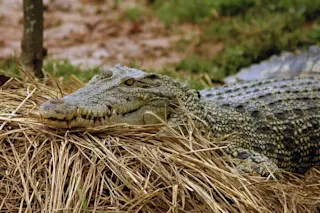A female American crocodile has spent her entire life in captivity in a reptile park in Costa Rica and just laid several fertile eggs — without mating first.
This recent event means that researchers are now adding crocodilians to a growing list of birds, reptiles, amphibians and fish that can generate offspring without the help of a male mate.
“It’s likely that this has happened for thousands and thousands of years and [has] just been missed,” says Warren Booth, an evolutionary biologist at Virginia Tech.
Crocodile Eggs From Parthenogenesis?
Quetzal Dwyer, the owner of Parque Reptilandia, initially discovered that the male crocodile he had was in fact female when his staff noticed the crocodile was aggressive whenever they approached a specific area. This is common nest-guarding behavior, and “the reptile keepers had some idea that something was going on,” Booth says.
They dug around the area the crocodile was guarding and found a nest full of eggs. Since they had acquired the crocodile when it was a year or two old, and it was alone for more than a decade and a half, the eggs should have been infertile.
But being friends with Booth and his colleague Gordon Schuett at Georgia State University, who both published several studies on parthenogenesis — the ability for females to reproduce without males, aka a “virgin birth” — Dwyer wanted to know for sure.
Dwyer and his staff shone flashlights against the side of the eggs. If eggs are fertile, the light will reveal a dark band around the center of the egg. Seven eggs had the band and were indeed fertile. The team then moved them to an incubator, says Booth.
Unfortunately, none of the eggs hatched. About a week after expected hatching time, the staff made incisions to see what happened. Six eggs were just yolk, but one had a fully formed female embryo. The crocodile was still born, but a closer examination didn’t reveal any deformities or any other obvious reasons why it didn’t hatch.
Read More: Crocodiles Are Particularly Good Mothers
Genetic Proof
While the female’s years of isolation may seem like proof that she had no male help in her reproduction, stranger things have happened before. Some reptile keepers have claimed parthenogenesis, only to find out later that their female snakes just mated years earlier.
“Reptiles have an incredible ability to store sperm,” Booth says.
Dwyer and his team extracted DNA from the mother as well as the embryo and sent it to Booth for testing, as described in a study they published recently in Biology Letters with colleagues.
The genetic analysis revealed that 99 percent of the DNA came from the mother — the other 1 percent was normal genetic mutation.
Not True Clones
Booth says that a lot can go wrong during incubation to stop a reptile from hatching. And the genetic make-up of the embryos is often a big obstacle.
Most embryos carry the genes of both parents. But in this kind of parthenogenesis, the mother’s egg fuses with the byproduct of egg formation called a polar body. The egg appears to fertilize, and an embryo develops.
While the embryo only carries DNA from the mother plus a few mutations, it isn’t a full clone because only half the number of chromosomes are copied. The embryo is therefore missing a full set.
“It’s basically a really highly inbred offspring that lacks genetic diversity,” Booth says, adding that this lack of genetic diversity is another reason why many of these virgin births never truly become births.
This isn’t to say that they couldn’t, though. Other research on chickens has revealed that while most parthenogenically produced eggs don’t survive, a small percentage “hatch and do fine,” Booth says. “The fact that it didn’t hatch isn’t a big deal. It doesn’t mean that another crocodile produced by parthenogenesis couldn’t hatch,” he adds.
Read More: Turkeys Are Capable of "Virgin Birth"
Reptile Parthenogenesis
Part of the reason this hasn’t been discovered in crocodilians before is that people just haven’t been paying close enough attention. Parthenogenesis is difficult to confirm in wild animals without genetic testing.
And many zookeepers or people who keep reptiles as pets often assume the eggs produced are infertile and destroy them without checking. Even 10 years ago, Booth says only a handful of studies had recorded parthenogenesis in snakes. So, people thought it was rare.
But since then, Booth and others have published much more research on the phenomenon, recording virgin births in species from cottonmouths to Komodo dragons. This is the first recorded crocodilian to have shown the ability, but it’s likely been happening for a long time.
“In my opinion, it’s not a rarity — it simply hasn’t been recorded,” he says.
Virgin Dinosaur Births?
The fact that snakes, lizards and crocodiles can reproduce parthenogenetically, scientists also predict that turtles and birds can as well, Booth says.
This would mean that dinosaurs and pterosaurs, which most paleontologists place between modern reptiles and birds on the evolutionary tree, might have been able to reproduce parthenogenetically, Booth speculates, “which I think is pretty cool.”
Unfortunately, scientists are unlikely to discover proof of that, he laments.
Read More: Did All Dinosaurs Lay Eggs?















